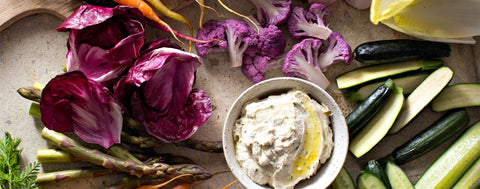Typically, when the word bacteria is mentioned we might initially think of dirt, infection and disease. For this there is fair reason, as we look back historically to plagues that wiped out large proportions of our population. But, we cannot vilify all bacteria. There are some which are fundamental to all human life, our normal gut bacteria.
The colony of bacteria (and some yeasts) that inhabit the length of our digestive tract, touted as the ‘good’ gut bugs, make up our gastrointestinal microbiome (‘mirco’ – small/microscopic and ‘biome’ - naturally occurring community).
When looking for ways to protect or enhance the gut microbiome, consider the metaphor of tending a garden. The soil is the foundation from which all things grow, in this case a healthy gut wall. The fertilizer is to support and encourage growth, the foods in which we put into our bodies that feed gut bacteria. Finally, the seeds, these are the bacteria themselves.
The fertilizers AKA prebiotics
Prebiotics are beneficial food fibers which are non-digestible and are able to selectively stimulate the growth or activity of gastrointestinal bacteria. These foods are not broken-down by stomach juices or absorbed by the small intestines, but make it intact to the large intestine to be used as food and fuel for our beneficial gut bugs. The most commonly known prebiotics are inulin, lactulose, fructo-oligosaccharides (FOS) and galacto-oligosaccharides (GOS).
These gut fertilizing fibers are commonly found in food such as asparagus, banana, chicory root, onion, garlic, leek and artichoke. Slippery elm powder and psyllium husks are also prebiotic fibers.
Prebiotic foods and fibers can be taken with probiotics (food or supplemental) to ensure their rate of survival and encourage optimal function.
Some unfavorable gastrointestinal effects (bloating, increased flatulence) can be experienced by some individuals following prebiotic consumption in large amounts. This is a normal experience and as such, initial dosing is recommended to begin lower or in smaller amounts and gradually increase.
Planting the seeds AKA probiotics
The term ‘probiotic’ is Greek in origin, and translates to ‘for life’. It is also defined by the World Health Organization as “live microorganisms which when administered in adequate amounts confer health benefits on the host”. These are the seeds for your gut garden, one or more of the normal microbes found in the gut are consumed to help promote wellbeing.
While there are many strains of probiotics, Lactobacillus and Bifidobacterium are the two most commonly found species and have been extensively studied and researched.
Probiotic organisms can be found in commonly fermented food products such as yoghurts, sauerkraut, kimchi and kefir. They can also be found in supplemental forms as powder or liquid.
Taking probiotics as fermented foods or in supplemental form can help to maintain the normal functioning of a healthy microbiome, rebalance a compromised or ‘sick’ microbiome and reduce symptoms of specific health disorders.
For general health and wellbeing ingesting a wide variety of probiotic strains is recommended and can be achieved with regular consumption of a number of fermented foods or taking a supplement with a diverse range of beneficial bacteria. When looking to improve more specific health complaints (eg. IBS, SIBO, allergies or eczema) typically there are specific probiotics strains that have shown, through scientific research, to be effective for the correlating condition.
For your specific Pre- and Pro- queries, talk to one of our qualified huckleberry naturopaths.
Article by - Huckleberry Naturopath Kate Dalliessi




